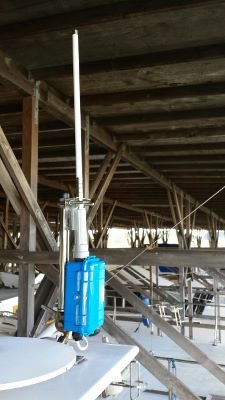I just got an internet WiFi booster for my boat. I'm going to install it in such a way that I can easily transfer it to my Hi-Lo. I chose the Wirie brand because it is essentially plug and play (Marine WiFi and RV WiFi and 3G/4G solutions: The Wirie AP+, The Wirie pro, and The Wirie xG). The unit sets up its own WiFi hotspot, so a physical connection is not required from the device to the laptop, tablet, etc. All that is required is 12-24 volts DC power. In addition, this unit has had some good reviews in boating forums.
I got the WiFi only version (they also make a WiFi/cellular and a cellular only version) because I just need to get a good WiFi signal at marinas and campgrounds. If I decide that I also need cellular based internet I can buy an upgrade kit later. The need for this became clear this past weekend. I could only get one bar of WiFi signal at the campground that I was at. I ended up taking my tablet by the campground office in order to get adequate signal.
For the Hi-Lo I'm planning on mounting the unit on an extendible aluminum pole that I already have. When I set up camp I'll clamp the pole to the tongue jack and will run power straight from the batteries.
Incidentally, in case you wonder why in the world do I need WiFi while boating or camping, my wife's employer allows her to work remotely. She does not get as much vacation as I do, so this is a way for her to go camping or boating on workdays.
I got the WiFi only version (they also make a WiFi/cellular and a cellular only version) because I just need to get a good WiFi signal at marinas and campgrounds. If I decide that I also need cellular based internet I can buy an upgrade kit later. The need for this became clear this past weekend. I could only get one bar of WiFi signal at the campground that I was at. I ended up taking my tablet by the campground office in order to get adequate signal.
For the Hi-Lo I'm planning on mounting the unit on an extendible aluminum pole that I already have. When I set up camp I'll clamp the pole to the tongue jack and will run power straight from the batteries.
Incidentally, in case you wonder why in the world do I need WiFi while boating or camping, my wife's employer allows her to work remotely. She does not get as much vacation as I do, so this is a way for her to go camping or boating on workdays.


